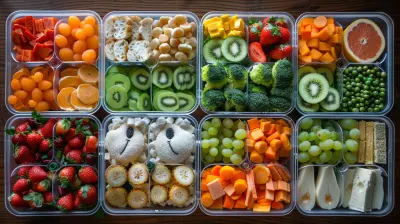How Fathers Can Foster Emotional Intelligence in Their Kids
16 February 2025
In today's ever-evolving world, emotional intelligence (EQ) has become just as important as academic accomplishments. For fathers, developing their children's emotional intelligence can feel like navigating uncharted territory. Yet, this task is crucial. Emotional intelligence allows kids to understand their feelings, manage their emotions, build strong relationships, and navigate life's challenges with resilience.
But how can fathers—many of whom often aren't taught to express their own emotions—help their children grow emotionally? Stick with me, and I'll show you some effective, down-to-earth strategies that dads can use to foster EQ in their little ones.

What Is Emotional Intelligence Anyway?
Before diving into "how" to foster emotional intelligence, let’s understand "what" we're talking about. Emotional Intelligence isn’t just a trendy buzzword—it's a real set of skills that helps kids manage both their emotions and the emotions of others.The five core components of emotional intelligence are:
1. Self-awareness: Recognizing and understanding your own emotions.
2. Self-regulation: Managing or redirecting your emotions.
3. Motivation: Using emotions to fuel positive behavior.
4. Empathy: Understanding the emotions of others.
5. Social skills: Effectively managing relationships and navigating social complexities.
Now that we know what we're aiming for, let’s jump into how dads can help their kids develop these qualities.

Be the Emotional Role Model
First and foremost, kids learn from what they see. If you, as a father, frequently bottle up your emotions or lash out in frustration, your children may adopt these unhealthy emotional habits. The saying “actions speak louder than words” couldn’t be truer when it comes to emotional intelligence.Show Them It’s Okay to Feel
It’s crucial to show your children that all emotions—yes, all of them—are valid. Whether you're experiencing joy, disappointment, frustration, or sadness, let your kids see that you feel things too. But beyond that, show them how to process those feelings constructively.For example, if you're upset after a long day at work, don’t just sit in silence or snap at the family. Take a moment to explain: “I’m feeling really frustrated right now because work was tough today. I’m going to take a few deep breaths to calm myself.” By doing this, you’re not only showing that it’s okay to experience frustration, but also demonstrating a healthy way to manage it.
Use Words to Express Emotions
Kids aren’t born with an innate ability to express their feelings verbally—they need to learn it. Fathers can help by consistently using emotion-focused language. Instead of saying, “I’m angry,” be more specific: “I’m upset because I felt ignored.” The more you model this type of language, the better your child will understand and express their own emotions.
Encourage Open Communication
Here’s the thing—kids need to know it’s safe to express their emotions. This doesn't happen overnight; it’s something you have to build over time. As a father, creating a safe, non-judgmental space for your child to express their feelings is key.Ask Questions and Listen (Really Listen!)
Start by asking open-ended questions. It might feel awkward at first—especially if your child isn’t used to sharing—but the more you try, the easier it becomes.Consider questions like:
- "How did that make you feel?"
- "What was the best part of your day?"
- "Is there something on your mind?"
And once they answer, make sure you listen. I mean, really listen. Often, we’re so focused on giving advice or “fixing” problems that we forget to just let our children talk. Sometimes, they just need to feel heard.
Validate Their Emotions
Once they've opened up, don’t brush off their feelings. Imagine you recently had a lousy day at work, and your partner responded with, “Get over it. It’s not that bad.” How would that make you feel? Probably dismissed and misunderstood.Kids are no different. If they come to you feeling sad because a friend didn’t play with them at recess, validate their experience. You don’t need to fix it, just acknowledge it. Say something like, “I can see why that would make you feel sad; it’s tough when friends don’t include us.”

Teach Problem-Solving and Emotional Regulation
Emotions can run wild—especially in kids! And while it’s essential to recognize feelings, it's equally important to guide them in managing those emotions effectively.Help Them Label Their Emotions
One of the best tools you can give your children is the ability to identify what they’re feeling. For young kids, emotions can be confusing and overwhelming. They know they feel "bad," but might not know why or what to do about it.Start by giving your kids the vocabulary to explain their emotions. When they seem upset, you might say, “It looks like you’re feeling frustrated because your tower fell down. Is that right?” By putting words to their feelings, they can better understand and express their emotions in the future.
Guide Them Towards Solutions
Once they’ve recognized the emotion, the next step is helping them manage it. For example, if they’re frustrated, what can they do to calm down? Maybe it’s taking deep breaths, squeezing a stress ball, or even listening to some calming music.Remember, you're not solving the problem for them. You’re guiding them toward thinking about solutions.
Encourage Empathy and Understanding
Empathy is a powerful component of emotional intelligence. It’s also something that fathers can cultivate in their kids by teaching them to consider other people's perspectives.Lead by Example
One of the easiest ways to teach empathy is by displaying it yourself. Whether it's showing kindness to a stranger, offering to help a neighbor, or simply listening attentively to your partner, these are all opportunities to model empathetic behavior for your children.Teach the “Why” Behind Actions
Children are naturally curious, and they often ask why people act a certain way. Instead of brushing off their questions, use this as an opportunity to foster empathy. For example, if your child asks why someone is homeless, take the time to explain the complexities behind it, such as financial struggles or personal hardship. This helps them understand that everyone has their own story, and encourages compassion.Encourage Perspective-Taking
When your child has a disagreement with a friend or sibling, ask them to imagine how the other person might be feeling. Encourage them to step into the other person’s shoes and consider their point of view. This practice will help them become more thoughtful and empathetic individuals.
Use Play as a Tool for Building Emotional Intelligence
Playtime is more than just fun and games—it’s also a powerful opportunity for emotional growth. Through play, children can explore their emotions, test boundaries, and develop problem-solving skills.Engage in Pretend Play
When you engage in pretend play with your child, it opens up a world of possibilities for emotional growth. Let them lead the game, but use it as a chance to discuss emotions. For example, if you’re playing house and the “dog” gets lost, ask your child how the pretend family might feel. These hypothetical situations can help prepare them for real-life emotional experiences.Use Books and Stories
Stories are an excellent tool for discussing emotions and empathy. As you read to your child, stop and ask questions about how the characters might feel in different situations. “How do you think she feels now that her toy is broken?” This simple act of discussing emotions in a safe, fictional context can help your child grasp emotional concepts more easily.Foster Independence and Resilience
Ultimately, part of teaching emotional intelligence is preparing children to handle their emotions independently. Both independence in thinking and resilience during tough times are signs of high emotional intelligence.Let Them Face Challenges
It’s natural to want to shield your child from any hardship. But in doing so, you rob them of valuable life lessons. When your child faces a challenge—whether it’s a tricky puzzle or a disagreement with a friend—try stepping back. Allow them to navigate the situation with only gentle guidance from you. This helps build resilience and teaches them how to manage their emotions in difficult times.Praise Effort, Not Outcomes
When fostering emotional intelligence, it's essential to emphasize effort over outcome. Rather than praising your child solely for getting an "A" in school, praise them for how hard they worked. This reinforces the idea that perseverance is valuable, and that setbacks are part of the journey.In doing so, you not only encourage a healthy relationship with success and failure but also teach them that emotions—even negative ones—are manageable and do not define their worth.
Final Thoughts
Fostering emotional intelligence in your child as a father is an ongoing process. It requires patience, consistency, and most importantly: love. By becoming an emotional role model, encouraging open communication, teaching empathy, and guiding emotional regulation, you’re setting your child up for a lifetime of emotional wellbeing.Remember, the goal isn’t to raise a perfect child or one who never gets upset. The goal is to raise a child who understands their emotions, can manage their feelings, and shows empathy towards others—a true sign of emotional intelligence.
all images in this post were generated using AI tools
Category:
FatherhoodAuthor:

Kelly Snow
Discussion
rate this article
13 comments
Arwen McKinley
Such valuable insights for nurturing connections!
April 1, 2025 at 3:00 PM

Kelly Snow
Thank you! I'm glad you found the insights valuable for building connections.
Nico McLaurin
Empathy blooms in love.
March 22, 2025 at 4:03 PM

Kelly Snow
Absolutely! Love is a powerful foundation for empathy, helping children understand and connect with others' feelings.
Cora Jones
Empowering our children with emotional intelligence strengthens their resilience and relationships—what a beautiful gift to share!
March 17, 2025 at 3:29 AM

Kelly Snow
Thank you! Building emotional intelligence is indeed a powerful gift that helps children thrive in life and relationships.
Xeno Baker
Dads, step up! Your engagement shapes emotionally intelligent kids—don’t underestimate your power!
March 11, 2025 at 3:59 AM

Kelly Snow
Absolutely! Fathers play a crucial role in developing emotional intelligence. Your involvement makes a lasting impact—engage, listen, and guide your kids for their emotional growth!
Chantal McIlwain
Dads: Less grunting, more feeling!
March 10, 2025 at 5:25 PM

Kelly Snow
Absolutely! Embracing emotions fosters connection and teaches kids that it's okay to express their feelings. Let's lead by example!
Stephen Kim
This article is a treasure trove of insights! I'm curious about practical examples of how fathers can model emotional intelligence in everyday situations. Are there specific activities or conversations that can make a significant impact? I'd love to hear more about fostering those essential skills in our kids!
March 10, 2025 at 4:44 AM

Kelly Snow
Thank you for your enthusiasm! Fathers can model emotional intelligence through activities like family discussions about feelings during dinner, role-playing scenarios to practice empathy, and engaging in active listening during daily conversations. Small, consistent moments can make a big impact!
Harrison Hughes
This is such a valuable read! As dads, we have the power to shape our kids' emotional growth—let’s embrace it together!
March 9, 2025 at 5:49 AM

Kelly Snow
Thank you! Absolutely, fathers play a crucial role in nurturing emotional intelligence. Let’s empower each other on this journey!
Cara Perez
Loved this article! It's so important for dads to actively nurture their children's emotional intelligence. Simple strategies can make a big difference. Excited to try out some of these tips with my little ones! Thank you!
March 7, 2025 at 5:01 PM

Kelly Snow
Thank you for your kind words! I'm glad you found the tips helpful—best of luck implementing them with your little ones!
Solenne Lopez
Emotional intelligence? Dads, it’s not just for mom—time to step up and level up!
March 2, 2025 at 5:24 AM

Kelly Snow
Absolutely! Dads play a crucial role in developing emotional intelligence. By being present and actively engaging with their children's feelings, they can help nurture empathy and resilience.
Lorelei McConnell
Great insights! Fathers play a crucial role in nurturing emotional intelligence. Keep it up!
February 28, 2025 at 4:14 AM

Kelly Snow
Thank you for your feedback! I'm glad you found the insights valuable. Fathers truly make a significant impact on emotional intelligence development.
Zora McRae
What a delightful read! It's heartwarming to see fathers taking an active role in nurturing emotional intelligence in their children. By fostering open conversations and sharing feelings, dads not only create strong bonds but also equip their kids with essential life skills. Let’s celebrate these loving efforts!
February 27, 2025 at 3:50 PM

Kelly Snow
Thank you for your kind words! I'm glad you enjoyed the article and appreciate the importance of fathers in nurturing emotional intelligence. Let's continue to support these vital efforts!
Adria Harper
This article provides valuable insights into the crucial role fathers play in developing their children's emotional intelligence. By fostering open communication and modeling emotional awareness, dads can significantly enhance their kids' ability to navigate relationships and express their feelings effectively.
February 27, 2025 at 4:42 AM

Kelly Snow
Thank you for your thoughtful comment! I’m glad you found the insights valuable. Fathers play a vital role in shaping their children’s emotional intelligence, and your points highlight that beautifully.
Velma Weber
This article offers valuable insights on nurturing emotional intelligence in children. By encouraging open communication, modeling empathy, and engaging in shared activities, fathers can significantly influence their kids' emotional development, promoting resilience and strong social skills for future success.
February 23, 2025 at 5:39 AM

Kelly Snow
Thank you for your thoughtful comment! I'm glad you found the insights on nurturing emotional intelligence in children valuable. Encouraging open communication and modeling empathy are indeed key steps for fathers in fostering resilience and strong social skills.
MORE POSTS

Digital Communication: Helping Kids Find Balance in Tech-Savvy Times

Instilling a Love of Reading from an Early Age

Smart Swaps for Healthier Family Dinners

Building Emotional Resilience in Your Child: Tips for Everyday Parenting

Expert-Approved Parenting Apps You Need in Your Toolkit

Healthy Eating on a Budget: Tips for Family Grocery Shopping

Understanding Developmental Stages and Communication Needs

How to Comfort Your Teething Baby Naturally

Packed Lunches that Fuel Your Child’s Brain